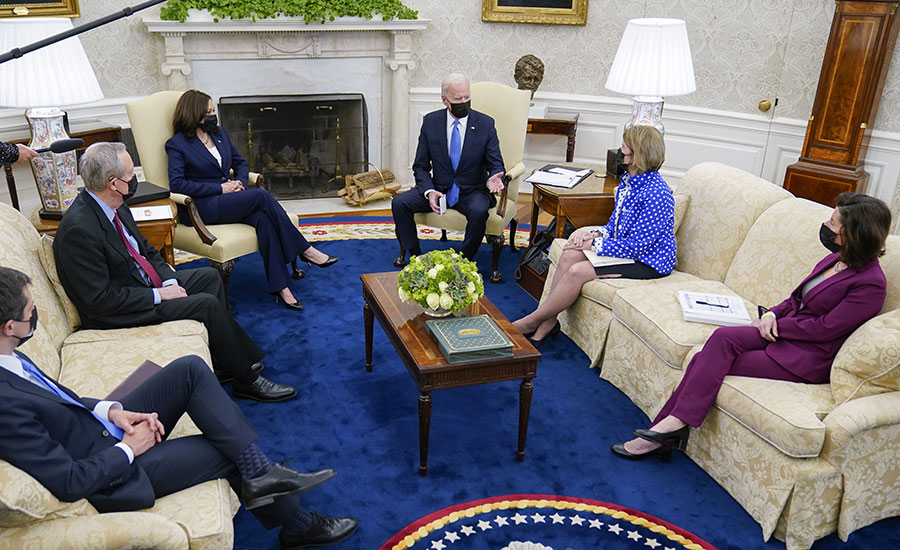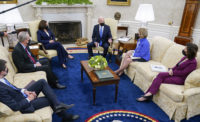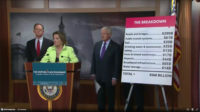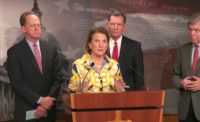The Biden administration has trimmed the size of its $2.25-trillion infrastructure proposal by about $550 billion, but the new $1.7-trillion offer drew a chilly response from Senate Republican negotiators.
White House Press Secretary Jen Psaki said at a May 21 press conference, “This proposal exhibits a willingness to come down in size, giving on some areas that are important to the president,while also staying firm in areas that are most vital to rebuilding our infrastructure and industries of the future, making our workforce and our country more competitive with China,” she said.
The new lower price tag came from several sources. Psaki said some of the reduction stemmed from funding shifts in President Joe Biden's original $2.25-trillion American Jobs Plan to other bills. The types of funding involved in that transfer include research and development, supply chains, manufacturing and small business.
In a May 21 White House memo to the lead GOP negotiator, Sen. Shelley Moore Capito (W.Va.), the administration says, "These investments are critical to securing our economic competitiveness, but we are prepared to pursue them separately." The new proposal also reduces Biden's proposed $100 billion for broadband to the GOP's proposed $65 billion.
Psaki also said the new offer pares the Biden American Jobs Plan's funding for roads, bridges and major projects “to come closer to the number proposed by the senators." According to the White House memo, obtained by ENR, the administration is now proposing $120 billion above current levels, down from Biden's original proposal of $159 billion.
The GOP puts its roads and bridges figure at $299 billion. But the White House memo says that represents just $48 billion in new investment.
In addition, the memo mentions an "Infrastructure Financing Facility." It notes that Biden's original plan included $27 billion for such an entity to "leverage private capital," but it was confined to energy infrastructure projects.
The memo also notes that the American Jobs Plan included $10 billion for a mechanism to provide "debt and equity capital to small and medium-sized manufacturers."
The administration says, "We are willing to find common ground faciity with a range of infrastructure projects eligible, including energy infrastructure.
GOP: Biden Plan Too Large
The Republican team criticized the new Biden proposal.
They said in a statement the new offer “is well above the range of what can pass Congress with bipartisan support.” The Republicans’ initial proposal was $568 billion. “There continues to be vast differences between the White House and Senate Republicans when it comes to the definition of infrastructure, the magnitude of proposed spending and how to pay for it. Based on today’s meeting, the groups seem further apart after two meetings with White House staff than they were after one meeting with President Biden.”
The meeting took place via conference call, they said.
According to Psaki, the White House team included Steve Ricchetti, counselor to the president; Louisa Terrell, director of legislative affairs; Brian Deese, director of the National Economic Council; Commerce Secretary Gina Raimondo; and Transportation Secretary Pete Buttigieg.
Still, the senators in their statement did not cut off the negotiations, saying they will “continue to engage in conversations with the administration."
Psaki said the GOP proposal “excludes entirely some proposals that are key to our competitiveness,” such as clean energy, “industries of the future in rebuilding our workforce, including critical investments in our power sector, building and construction, workforce training, veterans hospital construction and ‘the care economy.’ "
The White House team also stressed the importance being placed on “critical transportation infrastructure," specifically citing rail, "especially considering China’s level of investment in such projects," Psaki said, adding that other White House points of emphasis were resilience projects and Jobs Plan funds to remove lead drinking-water pipes.
Memo Underlines Biden Priorities
The memo amplifies Psaki's comments and underlines the priority Biden is placing on those areas. For example, it states, "The President believes we have an economic and moral obligation to eliminate lead pipes and service lines in this country, which particularly impac communities too often left behind."
It acknowledges that the water infrastructure bill that the Senate recently approved "is a step forward," but it adds that "your plan does not provide the new investment necessary to achieve this goal."
In transportation the memo cites electric vehicles, which would receive $178 billion in the Biden plan. The document says, "Our auto industry and workers agree that we need to invest in EV charging and related infrastructure, battery manufacturing and consumer incentives to make sure that America wins the clean vehicle future and the president is resolved that we make this happen."
Regarding the search for revenue to pay for the infrastructure package, Psaki said negotiators reiterated Biden’s strong stance against any taxes that would affect those earning less than $400,000 a year, and specifically pointed to the gasoline tax and other user fees.
The memo says that Biden "fundamentally disagrees with [Republicans'] approach of increasing the burden on working people through increased gas taxes and user fees, regardless of where users live or the type of vehicles they drive."
It also underscores that Biden has committed not to raise taxes on people with incomes below $400,000 per year, adding that "he intends to honor that commitment."
Although Republicans have emphasized that Biden's proposal to finance the infrastructure plan by rolling back a portion of the 2017 corporate tax reduction, the memo says that the infrastructure financing plan "should ensure that corporation are paying their fair share."
Buttigieg comments
Buttigieg, speaking at a May 21 press conference in Atlanta, said “we started very far apart and the essence of negotiation is to see if we can come together.”
"Through adjustments both to the size and scope of the president’s vision," he said, according to a pool reporter’s file, “ we have moved to the tune of about half a trillion dollars. I’m hopeful that that will yield more progress in this bipartisan conversation. But of course, there are more steps to that and we’ll see how they respond and where things go….”
Story updated on 5/24/2021 with comments from White House memo to Senate Republican negotiators.






Post a comment to this article
Report Abusive Comment